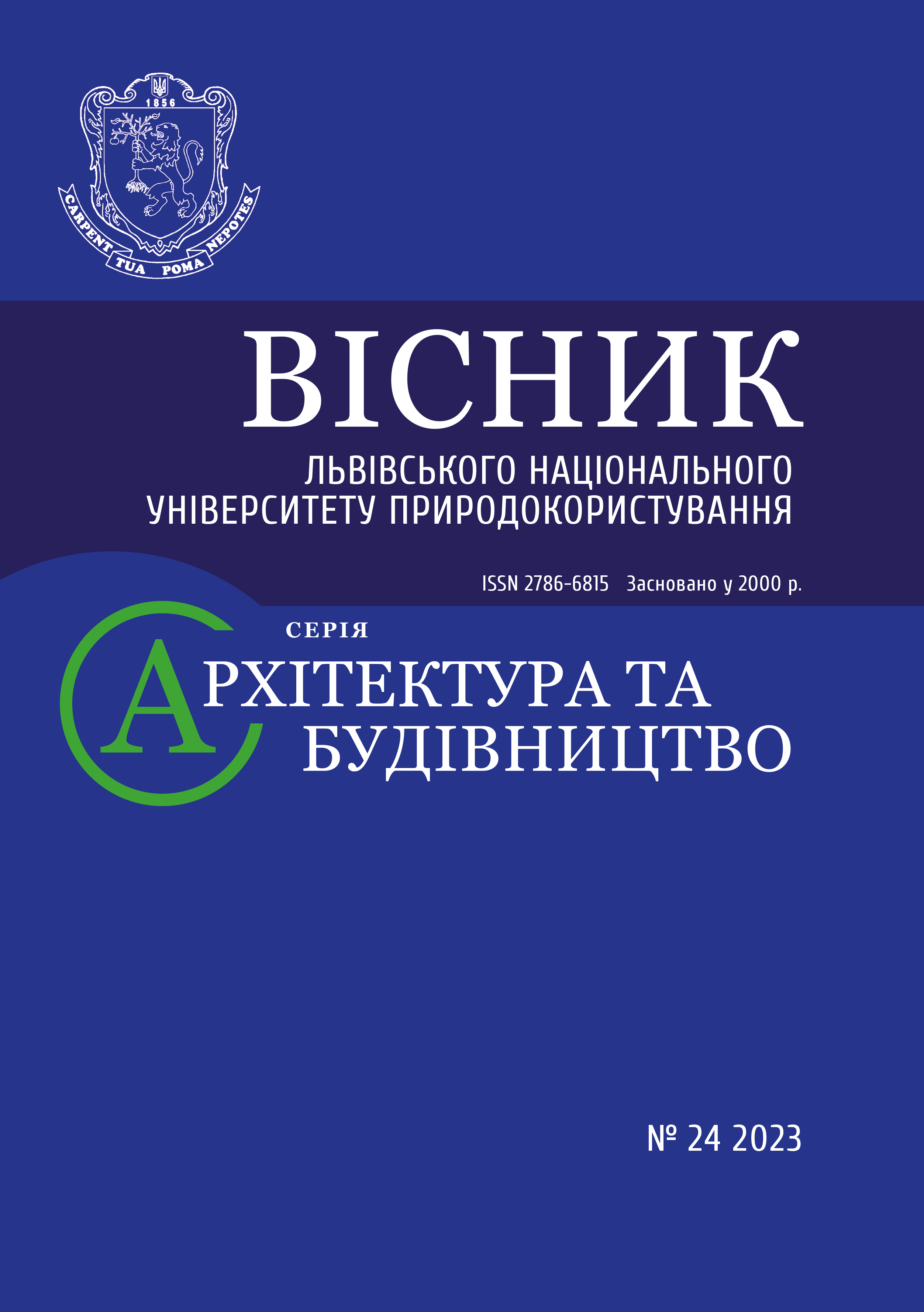ADAPTATION OF ANTHROPOSOPHICAL PRINCIPLES OF SHAPING IN THE THREE-DIMENSIONAL SOLUTIONS FOR DESIGNING AND REVITALIZING HISTORICAL BUILDINGS OF WALDORF PRESCHOOL AND EDUCATIONAL ESTABLISHMENTS
DOI:
https://doi.org/10.31734/architecture2023.24.093Keywords:
adaptive architecture, anthroposophy, preschool and educational institutions of Waldorf pedagogy, spatial environmentAbstract
The architectural environment of buildings of the preschool and educational institutions of Waldorf pedagogy is one of the most important components of children education. For creating a proper environment for the education and formation of a child's personality, a significant role is performed by spiritual science called anthroposophy. Adaptation of anthroposophical principles of shaping in the three-dimensional solutions when designing new and revitalizing historical buildings of preschool and educational institutions is one of the promising methods of achieving the goal in the architectural practice of designing children's institutions of Waldorf pedagogy. This goal is to create a harmonious and comfortable environment for children education.
A number of scientific methods were used in the research to solve the set tasks, particulalry synchronous (aimed to reveal the general conditions of development of the architectural and spatial environment of kindergartens); method of system analysis, method of characteristic and assessment of the conditions of architectural and spatial environment of kindergartens, abstraction (to study individual objects of the kindergartens of Waldorf pedagogy; analytical-synthetic (to formulate a holistic view of the current state of the problem of architectural and spatial environment of kindergartens); method of analogy (to establish correlations between kindergartens using different approaches to education); inductive method (to summarize results of studying available sources).
It is studied that architectural and spatial environment of the designed and revitalized buildings of preschool and educational institutions of Waldorf pedagogy, their material basis, is grounded on the principles of spiritual science called anthroposophy. The constructive and spatial solutions, building and finishing materials, color range of premises and elements of the spatial environment provide favorable conditions for upbringing and developing a child's personality.
The influence of architectural environment on children development has been established. The exceptional role of application and adaptation of anthroposophical principles in shaping the architectural environment of preschool and educational institutions of Waldorf pedagogy has been confirmed.
References
Architectural office Sonne-Frederiksen. URL: http://www.sonne-frederiksen.comindex.php/projects.html (Last accessed 04 June 2023).
Curtis D., Carter M. Designs for Living and Learning. Transforming Early Childhood Environments. Yorkton Court MN: Redleaf Press, 2015. 360 p.
Diachok O. M. Principles of formation of the architecture of schools with non-traditional teaching methods: autoref. Phd. Thesis. 2000. Kyiv. 20 p.
Ernst T. K. Principles of shaping the architectural environment of children educational institutions: autoref. Phd. Thesis Kyiv, 2007. 21 p.
Fiumara L. Significance of the architectural impulse of Rudolf Steiner for formation of Waldorf schools Child Waldorf+. 2012. P. 54–62. URL: http://www.nairi.org.ua/ dytyna-waldorf+/dytyna-2012-1.pdf (Last accessed 12 September 2021).
Fyumara L., Gorbik E. Introduction to the principles of organic architecture. URL: http://www.goetheanum.org/uploads/media/Prinzipy_Org_ Arx.pdf (Last accessed 04 December 2021).
Haugtussa Steinerbarnehage. URL: http://haugtussabarnehage.no/ storbarnsavdelingen/ (Last accessed 04 June 2023).
Homon O. O. Architectural and space design of educational complexes “Kindergarten – Elementary School”: Phd. Thesis. Kyiv, 2021.
Homon O. O. Functional and planning organization of the territory of an educational complex. KNUBA architectural bulletin. 2014. Vol. 3. 207–213.
Homon O. O. Functional and planning solutions of the educational complex “Kindergarten ‒ elementary school”. Modern problems of architecture and urban planning: scient/.-technical collection. Kyiv, 2014. Iss. 36. Р. 396–402.
Kadurina A. O. Architectural and artistic aspects of the formation of children's preschools (on the example of Odessa): autoref. Phd. Thesis Kyiv, 2005. 20 p.
Kadurina A. O. Principles of designing the spatial environment in the interiors of kindergartens, taking into account pedagogical methods. Bulletin of ODABA. 2004. No 13. P. 91−96.
Kingdom for fairy tales interview: Olga Gladush. Photo: courtesy of the architect. ELITE interior. 2011. No 06. P. 129−134.
Kosenko D. Yu., Sobchuk O. V., Chebykina M V., Vyshnevska O. V. Peculiarities of preschool furniture in Montessori and Waldorf pedagogy institutions. Technologies and design. 2017. № 2. URL: http://nbuv.gov.ua/UJRN/ td_2017_ 2_8 (Last accessed 02 June 2023).
Kosenko D. Yu. Spatial environment of the Waldorf school: practice and principles of formation. Waldorf pedagogy in the context of modern educational challenges: Materials of the International Scientific and Practical Conference (21 October 2014, Kyiv) / General ed. by V. B. Khalamendyk; Ministry of Education and Science of Ukraine, NSU named after M. P. Drahomanova, IAO, AVIU. Zaporizhzhia: Dyke Pole, 2015. P. 100−114.
Kosenko D.Yu., Mezentseva O.I. The spatial component of the educational environment: the experience of the Waldorf school. Collection of scientific works SWorld. 2012. Vol. 4 (25). P. 60−67.
Kovalska H. L. Modern trends in development of the network of children’s preschool and general education institutions. Experience and prospects of the Ukrainian cities development. 2012. No 23. P. 167−172.
Kovalska H. L. Properties of the network of educational institutions as an urban planning system. Experience and prospects of the Ukrainian cities development. 2014. No 27. P. 161−169.
Kovalska H. L. Urban planning fundamentals of the network of preschool and general educational institutions: Dr. Thesis Kyiv, 2016, 340 p.
Kovalska H. L. Urban planning problems of forming a network of educational institutions. Regional problems of architecture and urban planning. 2013. No 11−12. P. 43−46.
Kovalskyi L. M. Problems of development of the architecture of educational buildings: Dr. Thesis Kyiv, 1995. 339 p.
Lamekhova N. V. Architectural environment for preschool education: Phd. Thesis. Yekaterinburg, 2011. 175 p.
Letter to I. P. Eckerman. Schriften J. W. Goethe. zur Farbenlehre 1790-1807, DKV. 1829. Bd. XXV. 576 p.
Merylova I. O. Functional and planning organization of the network of extra-curricular education institutions (on the example of the Dnipropetrovsk region): Phd. Thesis Kyiv, 2018. 250 p.
Peters J., Esterl D. School building under the sign of spiritual functionalism. 44 years of school building under the sign of spiritual functionalism. People+Architecture. 2008. No 61/62 (5). P. 6–11.
Raab R. The Waldorf school builds: Sixty years of architecture of the Waldorf schools − school as a development space for humane building design / editor A. Klingborg. Verlag Freies Geistleben. 1982. 285 p.
Rousseau Jean-Jacques Emil, or about education. URL: https://readli.net/ chitat-online/?b= 225669&pg=23 (Last accessed 02.06.2023).
Steiner R. Kindergarten Gerresheim. URL: https://www.rudolf-steiner-kiga-gerresheim.de/ (Last accessed 04 June 2023).
Steiner R. The education of the child from the point of view of spiritual science First publication. «Lucifer-Gnosis», No 33, May 1907 (GA Vol. 34, pp. 309–348), 38 p. URL: http://anthroposophie.byu. edu/essays/a121.pdf (Last accessed 04 June 2023).
Steiner R. The pedagogical value of knowing human beings and the cultural value of pedagogy. Ten lectures Oosterbeek-Arnhem/Holland, July 17–24, 1924.
Yurchyshyn O. M., Idak Yu. V. Peculiarities of the compositional expression of children's preschool institutions. Bulletin of National Lviv Polytechnic University. 2010. No 674. P. 63−71.
Yurchyshyn O. M. Objects of children's preschool and extra-curricular education of extremely small capacity in a residential environment: autoref. Phd. Thesis Lviv, 2009. 24 p.
Zagvozdkin V. K. Rudolf Steiner is the founder of Waldorf pedagogy. Biographical sketch. URL: http://bdn-steiner.ru/modules/Books/files/1103.pdf (Last accessed 04 June 2023).


